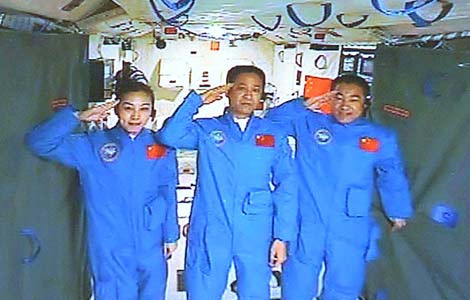Thucydides trap can be avoided
Updated: 2013-06-25 06:59
By Su Xiaohui (China Daily)
|
||||||||
China and the US must make greater efforts to understand each other's key interests and better manage their differences
The presidents of China and the United States wrapped up their two-day summit in Sunnylands, California, without signing a series of agreements or releasing a joint statement, as is usually the case at the end of a state visit. However, since the meetings were informal, the role of this summit was to act as a more effective way for the two countries to communicate with each other.
During the meetings, the two leaders touched upon a wide range of issues relating to the bilateral relationship, which was necessary to improve the dispute management between the two sides, and so help them escape the Thucydides trap, which refers to the ancient Greek historian's observation that a rising power can alarm an established power to such an extent that war is inevitable.
China and the United States have maintained and strengthened their military dialogue channels and military exchanges. In 2012, high-level military officials, including the defense ministers from both sides exchanged visits. The second China-US Strategic Security Dialogue was held in May last year and the 13th China-US Defense Consultation was held in December. Moreover, both sides promoted cooperation in areas of low sensitivity, such as humanitarian assistance and disaster relief.
However, neither China nor the US believes that the current exchanges are sufficient to build up mutual trust. On the one hand, China's growing military budget and capabilities have inevitably drawn some concern from the US. From the US' perspective, China still lacks transparency in its military development. On the other hand, the US' increasing military presence in the Asia-Pacific region has resulted in China's growing suspicions about its intentions. The truth is that the US is carrying out an extensive rebalancing, in which the military is a key part. The country has set out a plan to deploy 60 percent of its navy and 60 percent of its overseas-based air force in the region. The increase in deployment is moderate, but what matters is that some US officials have made it clear that this is partly to counterbalance China's military build-up.
Both sides have come to realize that the military relationship has had a negative impact on the overall bilateral relationship. Fortunately, the leaders agreed to strengthen the military-to-military relationship during their summit. The positive developments are that China will attend RIMPAC, the Rim of the Pacific Exercise, in 2014 at the invitation of the US. In previous years, the exercise hosted by the US has included a number of regional countries, but excluded China.
Some say that China's increasingly aggressive posture towards the South China Sea and the Diaoyu Islands in the East China Sea has increased the risks of China and the US falling into the Thucydides trap.
For six decades after the World War II, a US "Pax Pacifica" has provided the security framework for Asian countries. China, which will soon overtake the US as the world's largest economy, will seek more benefits in the region and demand revisions to the rules established by the US. In this context, the territorial disputes may serve as the breaking point.
However, there is possibility that the China and the US will be able to manage the disputes.
China does not aim for conflict. Actually, China is seeking a balance between defending its national interests and maintaining an agreeable regional environment. China is firm in defending its territorial sovereignty and legitimate rights, but, at the same time, it seeks peaceful development and is willing to solve the disputes with related parties through bilateral dialogue and negotiation. China made this point clear to the US. During the summit, President Xi Jinping made clear China's stance on the Diaoyu Islands and the South China Sea.
As for the US, the country acknowledges China's position and has realized China's determination to defend its sovereignty and territorial integrity. Misunderstandings and miscalculations can be avoided. As for the Diaoyu Islands, China's response to Japan's "nationalization" of three of the islands was beyond the expectations of both Japan and the US. The US will try to avoid any awkward situations in the future.
It is difficult for the US to change its basic principles when involving itself in the territorial issues in the Asia-Pacific. However, the US will be more cautious in staking out its position, and will strengthen management and control over related issues. The most likely situation is that the US will maintain the pressure on both China and other parties involved in the disputes, in order to prevent the disputes from escalating out of control.
Strategically, China and the US have achieved an agreement that a zero-sum game will harm both sides' interests and they will cooperate to avoid the Thucydides trap. Specifically, in the process of improving military exchanges and managing territorial issues, the two countries may find a way to finally establish a new type of relationship.
The author is deputy director at the department of international and strategic studies of the China Institute of International Studies.
www.chinausfocus.com
Most Viewed
Editor's Picks

|

|

|

|

|

|
Today's Top News
Berlusconi convicted on sex charges
US presses Russia over Snowden case
Xi: 'Exploration part of Chinese dream'
Chinese, Brazilian presidents discuss ties
China rejects Philippines' illegal seizure of reef
Immigration bill passes Senate vote
Liquidity squeeze bleeds equities
Surviving mountaineer in embassy
US Weekly

|

|















